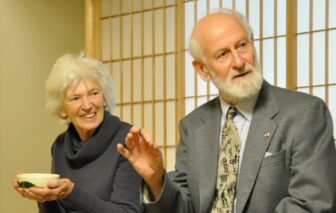
2009 Kyoto Prize Laureates
Biological Sciences(Evolution, Behavior, Ecology, Environment)
/ Evolutionary Biologist
1936 -
Professor Emeritus, Princeton University
2009
11 /11 Wed
Place:Kyoto International Conference Center
Evolution, Speciation and Long-Term Field Study
2009
11 /12 Thu
13:00 - 17:10
Place:Kyoto International Conference Center
Through the long-term field study more than 35 years on Darwin’s finches on the Galápagos Islands, the Grants demonstrated that morphology and behavior of organisms are altered rapidly by natural selection in response to recurrent environmental changes. Their work has not only made enormous contributions to evolutionary biology and ecology, but also has had a profound influence on the general public through demonstrating the evolution by natural selection in the field.
Dr. Peter Raymond Grant and Dr. Barbara Rosemary Grant have conducted the long-term field study more than thirty-five years since 1973, on Darwin’s finches on the Galápagos Islands, and demonstrated that morphology and behavior of organisms are altered rapidly by natural selection in response to environmental fluctuations. Their detailed work of evolutionary mechanisms has not only made enormous contributions to evolutionary biology and ecology, but also has had a profound influence on the general public through demonstrating the evolution by natural selection in the field.
The most impressive achievement of the Grants is their detailed study of how, within a dramatically changing natural environment, the beak size and shape of ground finches (genus Geospiza) have evolved rapidly by natural selection, as well as the mechanisms and the condition for the rapid evolution. Although there had been attempts showing natural selection before their work, the Grants were the first to closely trace the evolution taking place in the field for more than thirty-five years, and to study in detail all the aspects related to the evolutionary changes, such as the ecological factors responsible for natural selection, evolutionary responses, the directions in which many traits evolve, and the mechanisms that maintain the genetic variation necessary for evolutionary change. In evolutionary biology, where experimental studies tend to be difficult, the Grants’ empirical research has made the most important contribution since Darwin in making evolutionary biology as a science in which proof is possible.
Through long-term research on Darwin’s finches on the Galápagos Islands, the Grants have also elucidated a variety of evolutionary phenomena. These include the relationship between birdsong and reproductive isolation, genetic correlations among traits and their evolutionary changes, migration to new islands and the founder effect, detection of inbreeding depression in the natural populations, genetic introgression due to hybridization, and character displacement caused by dramatic environmental changes. Their research has set a standard for the field study of evolution, exerting a far-reaching influence on the study of evolution of other organisms.
In addition, the achievements by the Grants have helped to promote an accurate understanding of evolutionary phenomena among the general public. Their work has also suggested the significance of evolutionary biology in coping with the on-going environmental changes. Their contributions to evolutionary biology as a science certainly deserve the highest recognition.
For these reasons, the Inamori Foundation is pleased to present the 2009 Kyoto Prize in Basic Sciences to Dr. Peter Raymond Grant and Dr. Barbara Rosemary Grant.
Profile is at the time of the award.

Substantial Value in Connections Found Between Disparate Ideas and Facts
In this installment of the series, we had the pleasure of interviewing Dr. Peter Raymond Grant and Dr. Barbara Rosemary Grant, the 2009 Kyoto Prize laureates in the Basic Sciences category.

Drs. Grants win “Frontiers of Knowledge Award”
On February 6, the BBVA Foundation in Spain announced “Frontiers of Knowledge Award” went to Dr. Peter Grant and Dr. Rosemary Grant, Evolutionary Biologists of Princeton University in the United States.

Dr. Grants win Royal Medal
“The Royal Medal goes to Dr. Peter Grant and Dr. Rosemary Grant at Princeton University in the United States,” the Royal Society of London announced on July 18, 2017. They were recognized “for the research on the ecology and evolution of Darwin’s finches on the Galápagos, demonstrating that natural selection occurs frequently and that evolution...